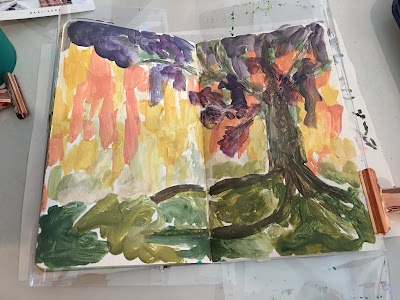So, Effy Wild has issued another 30 posts in 30 days blogging challenge. As reported here, April's challenge was the first 30-day anything challenge I've ever completed, and I was pretty pleased with that. (In fact, I'm pretty sure I haven't completed a 10-day or a 7-day challenge before, not even that Facebook favorite books thing.) I enjoyed the sense of making progress, even if it didn't quite generate enough excess energy to motivate me to clean the house, weed the yard, and run for fun. Also, I'm convinced that part of the reason I was successful is that I didn't really commit to the challenge, just to the idea of giving it a whirl & seeing what happened. Now that I've done it once, the pressure may be on if I do it again ... Also, the beginning of September is a much busier time of year for me than the beginning of April, between work stuff & family festivities.
Still, I did enjoy that sense of forward momentum. & I'm feeling a bit of positive energy moving into the fall and the new school year. New art projects are being posted online today. I finished part of an overdue project for work. The Labor Day long weekend is getting close. It's beautifully black & stormy here right now, although I know the weather has been far less benign in other places. The news is not good, but stressing about it won't make it better.
So I guess I've talked myself into taking on the challenge. Would I go so far as to say I'm committing too it? Well, let's not go putting labels on things just yet.
This post needs some book talk so it's not just random blathering. I think I'll highlight Drawing Down the Sun by Stephanie Woodfield, which I finished last weekend. It was a recommendation in Effy Wild's Moonshine suited to sunny July and focuses on solar goddesses. I've long been drawn to Thoth who, as a moon god, goes against the gender trend for moon deities. I hadn't realized quite how Greco-Roman (and, eventually, Christian--think of Orthodox art) the sun god myth and the "traditional" gendering of sun and moon are. It surprises me now how I'd never really thought about a sun goddess despite all of my mythological reading.
Some of the goddesses profiled in this book are incontrovertibly sun goddesses, like Norse Sunna and Japan's Amaterasu. With some, there's more (often compelling) interpretation involved, like Brigid with her association with the forge, smithing, and the fires of inspiration.Woodfield writes that the sun goddess is not just a gender-swapped sun god; her myths are different, one difference being that a common sun goddess theme is the myth of descent, whether of the winter sun or the sun at night. (I certainly can't remember too many myths dealing with the inconstancy of the male sun, even if Apolla/Helios does seem to lend out his chariot an awful lot.) I'm not sure how I feel about this; in some ways, it feels like envisioning a solar goddess is claiming a power that's been withheld and denied to women, and placing that power in a cycle of waxing and waning feels like it diminishes it a bit, ties it back to traditional notions of femininity. But surely part of that reaction is just a resistance to the descent itself.
Although Inanna is not one of the goddesses featured (Canaanite Shapash is), this book definitely makes me want to revisit how I think of her and the Gilgamesh episode with the Bull of Heaven. The myths where the sun has a sky or storm god for a brother also had me thinking of Coogan's The Old Testament.
Woodfield acknowledges that her book does not come from the cultural perspective of these goddess' original practitioners: her chapter on Yhi does not aim to give insight into Australian aboriginal spirituality, nor do the sections on Hathor, Sekhmet, and Bast try to recreate historical Egyptian practices. Instead, the chapter on each goddess recounts some of her central myths, gives correspondences and suggestions for spells and ritual work in the context of modern withcraft, and includes a pathworking or meditation to help guide a reader or practitioner to encounter the goddess. Although I love the cover of the self-published version, it's badly in need of proofreading. I assume the Llywelyn edition got a copy edit.







































